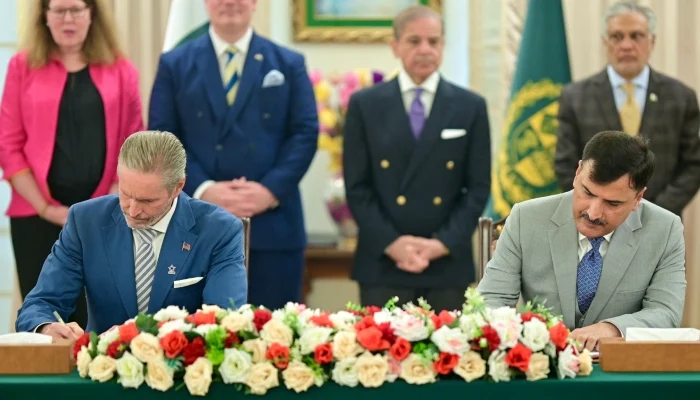$500 Million Minerals Deal Marks Diversification in US–Pakistan Economic Ties
US–Pakistan deal in critical minerals sector opens new avenues for investment, but success hinges on transparency, security, and global market conditions.
$500 Million Minerals Deal Marks Diversification in US–Pakistan Economic Ties
ISLAMABAD, September 20 (SPECIAL REPORT): Pakistan and the United States have entered into a US$500 million framework deal aimed at expanding cooperation in the critical minerals sector, a move officials say could diversify Pakistan’s external economic partnerships beyond existing reliance on China.
According to the Prime Minister’s Office, the agreement between U.S. Strategic Metals (USSM), a Missouri-based firm, and Pakistan’s Frontier Works Organization (FWO) envisages immediate exports of ores—including antimony, copper, gold, tungsten and rare earth elements—alongside plans for a potential polymetallic refinery in Pakistan.
A separate MoU between the National Logistics Corporation (NLC) and Portuguese firm Mota-Engil seeks to enhance transport links to support mining supply chains.
U.S. Chargé d’Affaires Natalie Baker hailed the signing as “an example of the strength of the U.S.–Pakistan bilateral relationship” and emphasized Washington’s interest in critical resources “vital for security and prosperity.” The U.S. Embassy noted that the agreements followed a delegation’s meetings at the Prime Minister’s House.
Officials in Islamabad highlighted the potential for early ore shipments to generate foreign exchange inflows, while acknowledging that larger projects such as refinery development would require feasibility studies, environmental clearances, permits, and financing.
Strategic and Political Context
Analysts note the significance of a U.S. firm’s entry into Pakistan’s mineral sector, traditionally dominated by Chinese investment through the China–Pakistan Economic Corridor (CPEC). Rather than displacing Beijing, the U.S. and European participation could diversify external stakeholders—a balance Islamabad must navigate amid U.S.–China supply chain rivalry.
Risks and Requirements
The mining sector in Pakistan has long faced criticism over opaque contracts, legal disputes, and governance challenges, with the Reko Diq project cited as a cautionary tale. Experts stress the need for transparent contracts, anti-corruption safeguards, and credible ESG frameworks covering emissions, water use, and community impact.
Security and social dimensions are equally critical, as many deposits lie in Balochistan, where community grievances and stability issues could undermine project execution.
Global market dynamics also matter: demand for critical minerals is rising due to electric vehicles and renewable energy, but price volatility means investors retain alternative options in Africa and Latin America. Pakistan must offer regulatory clarity, predictable fiscal terms, and reliable infrastructure to remain competitive.
Scale and Outlook
The US$500 million headline figure compares with Pakistan’s annual FDI inflows, typically in the low billions, suggesting significant potential if the MoU translates into funded projects. The NLC–Mota-Engil agreement acknowledges gaps in transport and utilities, underlining the need to build mine-to-port corridors.
The near-term test will be whether ore shipments commence and concrete steps—such as site selection, environmental assessments, permits, and financing—progress within the coming months.
If Islamabad can maintain balance between Chinese and Western partners, ensure transparency, and meet ESG and security standards, the deal could mark a step toward greater value-addition and foreign exchange resilience. If not, analysts caution, it risks being remembered only as a symbolic gesture.

